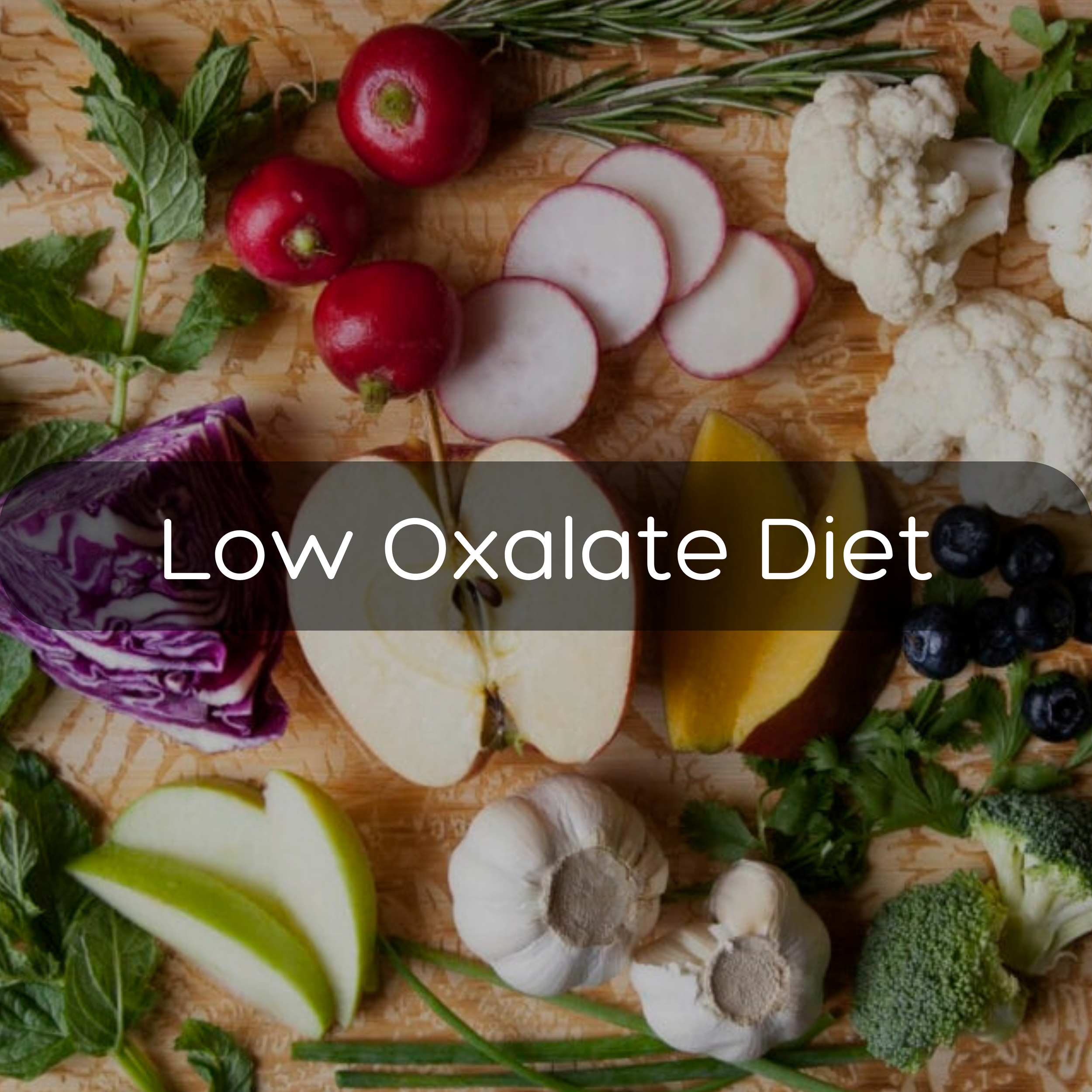Low Oxalate Diet
A low oxalate diet is a dietary approach aimed at reducing the intake of oxalate, a compound found in certain foods that can contribute to the formation of kidney stones or exacerbate symptoms in individuals with kidney stone disease or other conditions affected by oxalate absorption.
Characteristics of the low oxalate diet include:
Limiting high-oxalate foods: High-oxalate foods include certain fruits (such as berries, figs, and grapes), vegetables (examples include spinach, beets, and okra), nuts (such as almonds, cashews, and peanuts), seeds (examples are sesame seeds and pumpkin seeds), grains (such as wheat bran and quinoa), legumes (examples include soybeans and black beans), and beverages (such as tea and cocoa). These foods should be limited or avoided on a low oxalate diet to reduce oxalate intake.
Choosing low-oxalate alternatives: The low oxalate diet encourages the consumption of foods that are low in oxalate or considered safe for individuals with oxalate-related health concerns. This includes most meats, poultry, fish, eggs, dairy products (such as milk, cheese, and yogurt), fruits (examples include apples, pears, and melons), vegetables (such as cauliflower, cucumbers, and onions), grains (examples are rice and oats), and fats and oils.
Balancing calcium intake: Calcium can bind to oxalate in the digestive tract and reduce its absorption, which may help prevent oxalate-related health issues. While high-calcium foods such as dairy products are generally encouraged on a low oxalate diet, it's important to balance calcium intake with oxalate intake and consume calcium-rich foods in moderation.
Drinking plenty of fluids: Adequate hydration is important for preventing kidney stone formation and reducing the risk of oxalate-related health issues. Drinking plenty of fluids, specifically water, can help dilute urine and prevent the formation of oxalate crystals in the kidneys.
Avoiding oxalate supplements: In addition to dietary sources, oxalate can also be found in certain dietary supplements and herbal remedies. Individuals following a low oxalate diet should avoid supplements containing high levels of oxalate, such as calcium oxalate or magnesium oxalate supplements.
Potential health benefits attributed to the low oxalate diet:
Reduced risk of kidney stones: For individuals with a history of kidney stones or other oxalate-related health concerns, following a low oxalate diet may help reduce the risk of kidney stone formation or alleviate symptoms associated with kidney stone disease. By limiting oxalate intake, individuals can reduce the amount of oxalate excreted in urine, which can help prevent the formation of oxalate crystals in the kidneys.
Improved digestive health: In some individuals, high oxalate intake may contribute to digestive issues such as bloating, gas, abdominal pain, and diarrhoea. By reducing oxalate intake, particularly from high-oxalate foods that can exacerbate digestive symptoms, individuals may experience improvements in digestive comfort and overall gut health.
Better nutrient absorption: Oxalate can bind to minerals such as calcium, magnesium, and iron in the digestive tract, potentially interfering with their absorption. By reducing oxalate intake, individuals may improve the absorption of these essential nutrients and support overall health and well-being.
Potential symptom relief: Some individuals with oxalate-related health concerns, such as kidney stone disease or certain types of arthritis, may experience symptom relief by following a low oxalate diet. By reducing oxalate intake and avoiding foods that exacerbate symptoms, individuals may experience improvements in pain, inflammation, and other related symptoms.
A low oxalate diet is not suitable for everyone and it should only be considered for individuals with specific health conditions. Additionally, while reducing oxalate intake can help reduce the risk of kidney stones and alleviate symptoms in some individuals, it's not always necessary or appropriate for everyone.
A low oxalate diet should be undertaken under the guidance of a healthcare provider, particularly for individuals with specific medical conditions, dietary restrictions, or nutritional needs. Individuals considering a low oxalate diet should consult with a healthcare provider to ensure that their nutritional needs are met and to determine the most appropriate dietary approach for their specific health concerns.
Schedule an appointment with a Naturopathic Practitioner at Optimal Vitality to discuss your health concerns and to determine if a low oxalate diet is appropriate for you.



